冀教版六年级英语下册《Unit 3 What Will You Do This Summer. Lesson 14 Tomorrow We Will Play》教案_11
- 格式:docx
- 大小:33.56 KB
- 文档页数:5
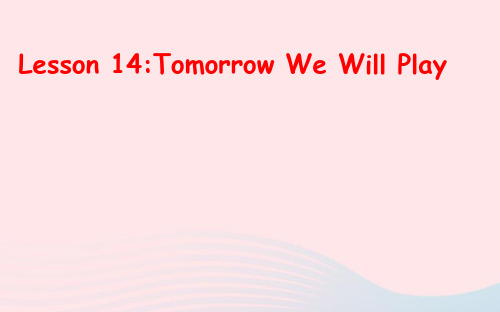

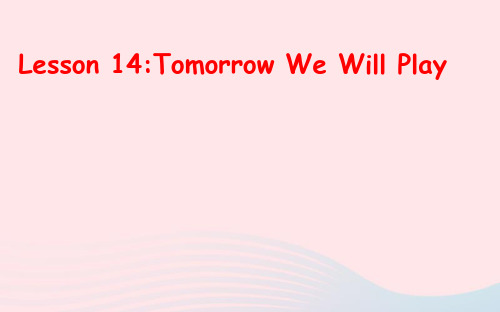
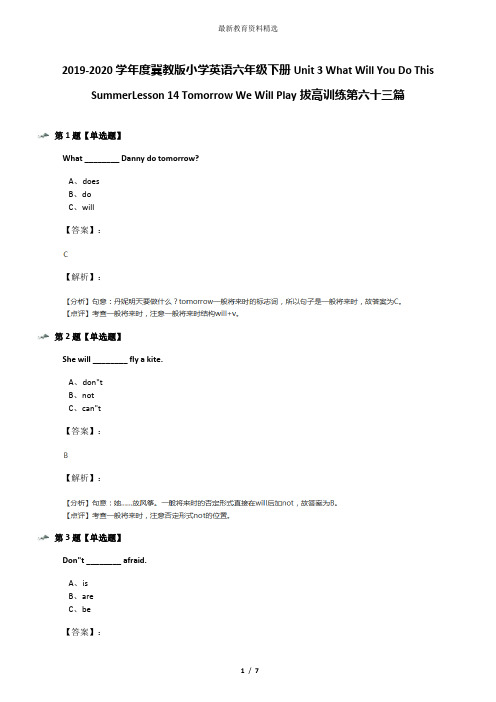
2019-2020学年度冀教版小学英语六年级下册Unit 3 What Will You Do This SummerLesson 14 Tomorrow We Will Play拔高训练第六十三篇第1题【单选题】What ________ Danny do tomorrow?A、doesB、doC、will【答案】:【解析】:第2题【单选题】She will ________ fly a kite.A、don"tB、notC、can"t【答案】:【解析】:第3题【单选题】Don"t ________ afraid.A、isB、areC、be【答案】:【解析】:第4题【单选题】She will run home ________ close the window.A、andB、butC、or【答案】:【解析】:第5题【判断题】In winter, many trees don"t have any leaves.A、正确B、错误【答案】:【解析】:第6题【判断题】It"s rainy. I will not go to the park to fly a kite.A、正确B、错误【答案】:【解析】:第7题【判断题】What will Lynn does tomorrow?A、正确B、错误【答案】:【解析】:第8题【填空题】看图,写出英语单词。
________________________【答案】:【解析】:第9题【阅读理解】【答案】:【解析】:第10题【阅读理解】What will Tina do at 7: 00 a.m.?______What will Judy do at 9: 00 a.m.?______What will Peter do at 5: 00 p.m.?______What will Tina and Judy do at 5: 00 p. m.?______【答案】:【解析】:第11题【句型转换】What are you going to do? (同义句转换)What ______ you ______? 【答案】:【解析】:第12题【句型转换】You can pick the flowers in the park. (变为否定句)You ______ ______ pick the flowers in the park. 【答案】:【解析】:第13题【句型转换】He will fly a kite next Saturday. (对画线部分提问)______ ______ he ______ next Saturday?【答案】:【解析】:第14题【句型转换】I will eat breakfast. (变为否定句)I ______ ______ eat breakfast.【答案】:【解析】:第15题【选词填空(词汇运用)】The boy will not pick any pears ______ his mother.I run home ______my friends.Li Ming will look ______the clouds.We will go on a trip ______week.You can"t pick the flowers ______the park.【答案】:【解析】:。
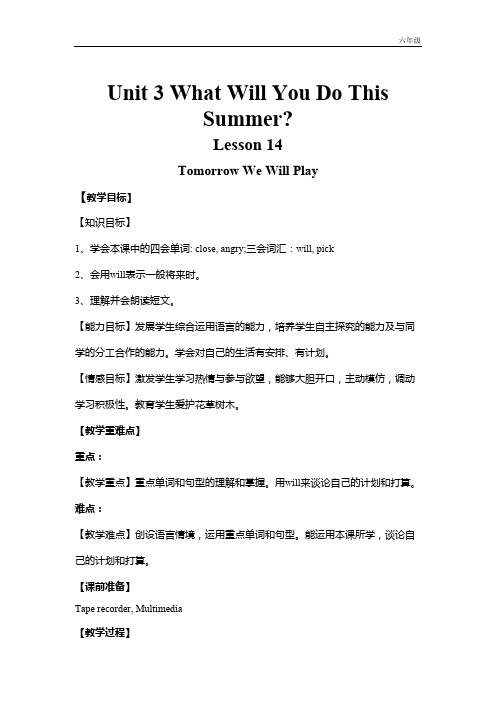
Unit 3 What Will You Do ThisSummer?Lesson 14Tomorrow We Will Play【教学目标】【知识目标】1、学会本课中的四会单词: close, angry;三会词汇:will, pick2、会用will表示一般将来时。
3、理解并会朗读短文。
【能力目标】发展学生综合运用语言的能力,培养学生自主探究的能力及与同学的分工合作的能力。
学会对自己的生活有安排、有计划。
【情感目标】激发学生学习热情与参与欲望,能够大胆开口,主动模仿,调动学习积极性。
教育学生爱护花草树木。
【教学重难点】重点:【教学重点】重点单词和句型的理解和掌握。
用will来谈论自己的计划和打算。
难点:【教学难点】创设语言情境,运用重点单词和句型。
能运用本课所学,谈论自己的计划和打算。
【课前准备】Tape recorder, Multimedia【教学过程】Step 1:Warm upReview "be going to"T: What are you going to do tomorrow ?S: I' m going to :...Ss:...Step 2:Presentation1. Talk about the pictures on Page40, focus on the word “will”. Tomorrow is Saturday. What will we do?We will go to the park. We will fly a kite.I am going to eat donuts tomorrow. = I will eat donuts tomorrow.2. Talk about the pictures, ask and answer.Will Danny fly a kite tomorrow?No. He will look at the beautiful flowersin the park.Will Danny pick some flowers for his mother?Yes, he will.Will Danny pick some flowers for his mother?Yes, he will.Danny! You can't pickthe flowers in the park!Err... Then I will runhome and close the door.Step 3:DrillsCircle the key words you learn.close, angry, will, pickStep 4:Practise1. Look and write. will or will notThey go on a trip next week.Summer is coming. It be hot soon. I need a fan.It's rainy. I go to the zoo today. I don't want to get wet.Next Spring Festival, I go to Harbin. It's too cold.2. Look, draw and writeThis Saturday, I will . This Sunday, I .This Saturday, I will . This Sunday, I .This Saturday, I will . This Sunday, I . Step5:Summary and evaluation1. Go through the key words and structures.2. Ask the students to give themselves an evaluation.Step6:Homework1. Copy the key words three times.2. Write a short passage about what you will do next week.。
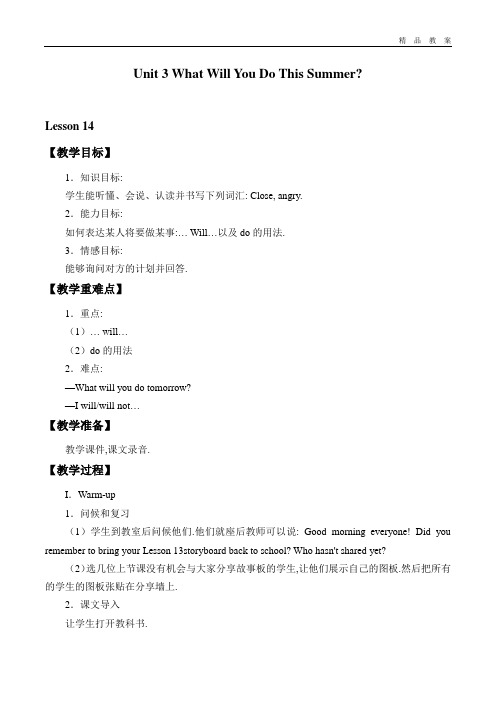
Unit 3 What Will You Do This Summer?Lesson 14【教学目标】1.知识目标:学生能听懂、会说、认读并书写下列词汇: Close, angry.2.能力目标:如何表达某人将要做某事:…Will…以及do的用法.3.情感目标:能够询问对方的计划并回答.【教学重难点】1.重点:(1)… will…(2)do的用法2.难点:—What will you do tomorrow?—I will/will not…【教学准备】教学课件,课文录音.【教学过程】I.Warm-up1.问候和复习(1)学生到教室后问候他们.他们就座后教师可以说: Good morning everyone! Did you remember to bring your Lesson 13storyboard back to school? Who hasn't shared yet?(2)选几位上节课没有机会与大家分享故事板的学生,让他们展示自己的图板.然后把所有的学生的图板张贴在分享墙上.2.课文导入让学生打开教科书.教师可以说: Look at the picture on page 40. What do you think Jenny and Danny are talking about in this story?II.PresentationWhat will you do tomorrow?1.演示(1)播放录音,让学生看书跟读.(2)指出第1部分的新词汇和句型:a.close, angry, pickb.What will we do?把新词汇和句型写在黑板上.大声拼读然后朗读这些词汇,同时让学生跟读.(3)再次播放录音,让学生齐读课文.(4)可用以下方式介绍will.教师解释will是be going to的另一种表达方法.在黑板上写如下三栏.让自告奋勇的学生将三栏的词画线连接起来,边连接边说出句子: Yesterday I...; Today I...; Tomorrow I am going to… 然后再加一栏.第四栏给出一个will的例子.让自告奋勇的学生填充这栏的其他空白部分.yesterday today tomorrowworked walk going to laughate go going to seelaughed jump going to eatjumped talk going to pointwent work going to playsaw eat going to helpPointed play going to workhelped help going to jumpPlayed see going to talktalked laugh going to gowalked point going to walk(5)和学生一起填写回答黑板上的5Ws + H表格,列出詹妮和丹尼在课文中讨论的所有事情.教学提示:故事的问题学生在了解故事时要回答5Ws+H问题,以便记忆故事的重要细节.Who is the event about?What happened?When did the event take place?Why did it happen?Where did it take place?How did the event/s happen?The 5Ws and H ChartWhat will you do tomorrow?Who is in the story? Danny and Jenny.What will Danny do? He will pick some flowers.When will they go to the park? On Saturday.Where will the story take place? In the park.Why will Danny go to the park? To pick his mother some flowers.Is Danny allowed to pick flowers? No, he isn't.How does Danny say he will getaway with picking flowers? He will run home and close the door.2.练习同伴活动:学生可以和同伴一起读课文故事.学生可以和同伴一起表演故事.一位同学扮演丹尼,另一位扮演詹妮.小组学生要做好给全班表演故事的准备.为让学生取出下列词汇卡片: pencil, book, kite, skipping rope, park和grass.将学生分为两人小组,把他们自己的词汇卡片堆在一起放在中间.学生轮流从中抽取卡片,读下列句子,在活动开始之前把这些句子写在黑板上.卡片句子Pencil Tomorrow I will write a story.Book Tomorrow I will read a book.He Tomorrow I will fly a kite.skipping rope Tomorrow I will skip with a skipping rope.Park Tomorrow I will go to the park.Grass Tomorrow I will lie on the grass.III.PracticeLet's do it!1.Look and write “will” or “will not”.让学生在空白处填写will和will not,完成2-1部分的句子.全班核对答案.答案: a.will b.will c.will not d.will not2.Look, draw and write.让学生填写表格中Me下面部分,完成2-2部分的表格.可以参考例子填写.学生按照a句詹妮的例子,完成各组句子.(1)This Saturday, I will __________.(2)This Sunday, I __________.3.让几位学生和全班分享他们的答案.可选活动:让几组学生和全班其他学生分享他们第2部分的练习.IV.Consolidation1.让学生告诉教师一些他们喜欢做的事情(例如他们可以说sing).2.将sing写在黑板上,然后说I will sing. 之后要设法唱一下.然后说I will not sing.教师要稍微等一下,以便学生理解.让学生再说更多的提议,重复进行以上过程.V.Summary1.重点词汇: close, angry.2.重点句子:… will /will not…例句:(1)I will not fly a kite.(2)We will go to the park.【作业布置】1.观看课文动画并跟读,按照正确的语音、语调朗读并表演课文对话.2.用I will/will not…造句.(不少于5句)3.预习Lesson15.。
Lesson14 Tomorrow We Will Play 一、看图,写单词。
1. 2. 3. 4. ________ ________ ________ ________ 二、选择正确答案。 ( ) 1. What ________ Danny do tomorrow? A. does B. do C. will ( ) 2. They will ________ some red apples. A. pick B. picks C. to pick ( ) 3. She will ________ fly a kite. A. don’t B. not C. can’t ( ) 4. Don’t ________ afraid. A. is B. are C. be ( ) 5. She will run home ________ close the window. A. and B. but C. or 三、按要求完成下列各题。 1. Tomorrow I am going to play sports. (把主语换成we) Tomorrow ________ ________ ________ ________ play sports. 2. I will eat breakfast. (变为否定句) I ________ ________ eat breakfast. 3. What are you going to do? (同义句转换) What ________ you ________? 4. He will fly a kite next Saturday. (对画线部分提问) ________ ________ he ________ next Saturday? 5. You can pick the flowers in the park. (变为否定句) You ________ ________ pick the flowers in the park. 6. I am going to visit my grandma tomorrow .(改为同义句)
Lesson14 Tomorrow We Will Play教学设计教材分析:
本课是冀教版小学英语六年级下册第三单元Lesson14Tomorrow We Will Play. 本课中,Jenny和Danny 在讨论他们的周末计划。
本节课主要学习由will 构成的一般将来时。
学情分析:
小学六年级的学生已经基本具备了英语学习素养,对于一些基本的单词与句型有了一定的了解。
而且,学生之前接触并学习了be going to 形式的一般将来时表达法。
因此,本课的学习相对简单一些。
教学目标:
1.学生能听懂、会说、认读和书写will 和angry
2.学生能熟练运用句子:What will you do tomorrow?
I will fly a kite.
3.学生能准确理解课文大意,并有感情的朗读课文,语音语调准确。
教学重难点:
1.教学重点:句型What will you do?的掌握与使用。
2.教学难点:对一般将来时的理解和运用。
教学准备:
花、话筒、短语卡片、课件
教学过程:
Step1Greetings
T: Good morning,class!
S s:Good morning,teacher!
T:Nice to meet you!
S s:Nice to meet you,too!
设计意图:【上课伊始,师生之间的相互问候,拉近了师生的距离。
】
Step2 Review
1.课件一一播放之前学过的短语图片。
学生说出相应的动词短语。
2.T: What are you going to do?
S1:I`m going to......
S2:I`m going to......
设计意图:【通过复习之前学过的动词短语和be going to 的运用,为下面的学习做好铺垫。
】
Step3 Presentation
1.T:What am I going to do tomorrow?Do you know?
I`m going to read a book.
I can also say”I will read a book.”
板书“will”
2.T:Can you change the sentences with“will”?
S1:She will go shopping.
S2:I will ride a bike.
S3:We will fly kites.
设计意图:【让学生在情境中理解will的含义,并体会will 在句中的位置。
引导学生观察板书,为学生进一步理解和运用will打下基础。
】
教师引导学生发现“will”“be going to”的区别:“be going to”随人称和数的变化而变化;
“will”没有人称和数的变化。
3.T:Open the books and turn to P41.Do Part2 ,please!
设计意图:【随学随练,检测学生的掌握程度。
】
4.T:Today is Friday.Tomorrow is......
S s:Saturday.
T:What will you do tomorrow?(板书)
教师一一展示出课前准备好的动词短语卡片。
fly a kite.
run home.
close the door.
look at the beautiful flowers.
5.T:If you pick the flowers ,I will be”angry”.Now, follow me!”angry”
S s:angry.
T:Will you pick the flowers?
S s:No,I will not pick the flowers.
6.T:Let`s read and answer!
a.全班齐读。
b.学生分角色读。
c.小组组内讨论问题。
d.展示答案。
设计意图:【学生小组内讨论问题,培养学生的合作意识。
】Step4 Practice
a.同桌对话
b.小记者采访
设计意图:【激发学生的说话欲望,培养学生以听说为基础的综合语言运用能力。
】
c.练习“will”“will not”
d.练习P41的第一部分。
Step5 Extension
课件播放图片
T:What should we say to them?
S s:Don`t pick the flowers!
Don`t walk on the grass!
设计意图:【通过展示图片,对学生进行保护环境的教育,增强学生的环保意识。
】
Step6 Summary
总结本课的重点词汇和重点句型。
设计意图:【对本课的重点词汇和句型进行总结,进一步加深学生对本课知识点的印象。
】
板书设计
Lesson14 Tomorrow We Will Play
What you do tomorrow?
go to the park.
fly a kite.
I will look at the beautiful flowers.
run home
close the door.
I will not pick the flowers.。